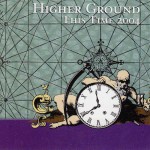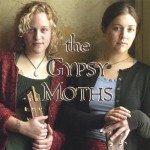Higher Ground
 This Time 2004
This Time 2004
Self-Produced
Out of Print
It’s been many years since multi-instrumentalist Alan Glickenhaus took over the reins of Higher Ground. With the departure of singer/guitarist David Kronenberg back in 1998, Glickenhaus assumed full control of the band- not without a great deal of personal rigor. But, since that time, the band has only gotten better with each successive album release- wherein Glickenhaus has been allowed the space to grow and stretch as a musician; while changing other personnel (only drummer Josh Biggs shares status with Alan as a founding member of the band, although Biggs has not been with the band the whole time). over the ensuing years to arrive at the current line-up, which includes vocalist Matt Demarinis (seemingly now a veteran of the band) and bassist Kevin Anderson- who did not play on HG‘s last album, Off The Rail, which was released a little over a year ago.
The band alternates between various grooves, incorporating rock, blues and funk elements into the more traditional country and folk roots music on which Glickenhaus and company have always relied. On the last outing, the band even explored middle eastern musical idioms, with decidedly mixed results- experiments which are nowhere to be found here; although eastern Europe is not out of the question.
The album kicks off with “Between You & Me,” one of three Charlie Packard compositions featured here. Packard, an eccentric Idaho recluse and friend of Glickenhaus, pens songs in the tradition of country rock bands such as New Riders Of The Purple Sage, Jerry Garcia’s acoustic band Old And In The Way (which also featured mandolinist David Grisman), as well as the more roots oriented traditions of Ray Wylie Hubbard and Jerry Jeff Walker; as well as Johnny Cash. “Between You & Me” is no different, resembling, somewhat, Cash’s “Big River.” Glickenhaus plays an array of backing instruments including guitar, pedal steel guitar, dobro guitar, banjo and mandolin, while Biggs and Anderson hold down the fort. Meanwhile Demarinis pins down the vocal duties, utilizing his buttery smooth delivery.
“Slippin’ Away,” a Glickenhaus/Demarinis composition, is country flavored number, with pedal steel guitar a-whinin’ and a-pinin’ in the background, and a certain Lynyrd Skynyrd sensibility. “Heaven’s Only Town,” another Packard original, is a rocking country number, along the lines of Steve Earle or Delbert McClinton. “Czeck’s In The Mail” is a freeform Glickenhaus mandolin jam: like a speeded up adaptation of the “Third Man Theme.” Their rendition of the Stanley Brothers chestnut, “Lonesome River,” is a tad bland in the vocal department, with Glickenhaus and Anderson unable to provide the sort of backing vocal blend displayed on the original version. But a reverent take, all the same.
Anderson’s “Burbon Cotton candy” is a sly little swamp rocker, with distinctive electric guitar and banjo accessorization. A Dead sensibility informs “Learn To Crawl,” with a familiar chuckling rhythm guitar, and high harmony backing vocals reminiscent of Jerry, Bob and the boys; while Glickenhaus’ electric guitar solos quote the Allman Brothers, among others. The banjo lament “Adele” traces familiar folk themes, while Demarinis breaks out his craggiest twang, recalling the Outlaws’ Henry Paul. Glickenhaus’ “Electric Eel,” a funky strutting extended jam instrumental, affords each member the opportunity to show what he can do on his instrument.
Given a homespun treatment worthy of Poco, Charlie Packard’s pretty piece of musical apple pie, the waltz “Friends Like You,” expounds a musical sentiment akin to Kenny Loggins’ “Watching The River Run,” without being too precious: a delicate balance, to be sure. Another minor-key mandolin ramble, “Son Of A Minor,” succeeds for the sincerity imbued in the performance of the song. The bluesy “Season Of The Witch” (think too of Neil Young’s “Down By The River,” sung by Steve Stills, perhaps) inflected raw appeal of “Spike My Gun” creates a sultry mood, enhanced by Glickenhaus’ hot lead licks and Demarinis’ laidback, smoky vocal.
Of late, Higher Ground have become primarily a recording entity, releasing an album every year for six or seven years now. This may be one of the tightest editions of the band, with a sharper focus on the material. The addition of Charlie Packard’s songs, which are a notch or two higher in quality than most of the band penned tunes, adds to the seamlessness of the presentation. But it is also true that the rhythm section’s interaction with Glickenhaus in all his various instrumental guises, has never been more supple. These guys are definitely on the way to somewhere, though the destination remains still somewhat unclear. Just the same, the ride should be quite interesting.
Rachel Taylor Brown
Do Not Stare
Shrewd Rube Records
This is a hard concept to fix in the mind, but here goes. If Bette Midler were a “singer/songwriter” (and a pretty good guitarist) and just launching her career today, she would probably end up sounding like Rachel Taylor Brown. Not that Brown sounds anything like Midler, or visa versa- or that Taylor Brown really sounds like anyone else in particular: because she doesn’t. But there is a certain off-kilter charm to this whole affair which calls to mind Bette Midler. Of course, this music calls to mind a lot of other performers- Sheryl Crow, Lucinda Williams and Bonnie Raitt, to name a few.
Rachel grew up singing and writing songs. She studied voice in college and has a degree in music. She is a soprano soloist and ensemble vocalist with the Portland Baroque Orchestra, among other organizations. She has sung at weddings, bar mitzvahs and assorted other functions. In addition she has performed as a back-up singer in the studio on recording projects with Foreigner, as well as the Chieftains. She has occasionally worked as a DJ at KINK. In other words, music is pretty much Rachel Taylor Brown’s life.
As a songwriter, Rachel is quirky, to say the least, drawing from a diverse variety of musical styles- from blues and rock idioms to show tunes and standards (she even quotes musical passages from Handel, fer chrissake!), she seems familiar and conversant with all and more. There is no pinning her down. From one song to the next, she may go in any direction. But her consistently skewed lyrical perspective always keeps things interesting.
The mood is set with “Lonnie,” a sideways rocker with an positively warped little electric guitar riff (Rachel plays all the guitars on the album) that ties the arrangement together. Starting off as if tuning her guitar, she rolls into the riff utilizing the lowest four open strings as part of the line. With cool, matter-of-fact phrasing on her vocal delivery, Rachel tells an offbeat tale of a gospel street hustler; over an infectious beat laid down by drummer John Reiner, bolstered by John Huckfeldt’s (Gravelpit, Jesus Presley) fluid basslines.
The song ends abruptly, mid-measure- dropping into the subsequent song, “Fingerprint,” a different song altogether. With just an effected acoustic guitar ( a Joni Mitchell chorus effect) and a solitary piano, Rachel relates a harrowing tale that might be tracing the fear and fog dynamic of an instance of child abuse: “‘Just remember that it’s our little game- can you keep a secret?’/(yes I can)/mama’s asking me if I’m okay/Something’s different in her face/‘has it ever happened before?’/(yes it has).”
“The Sutro Baths” is an adult narrative, with an unique perspective- performed with great love and care. Initially, the song is an intimate number, just a solitary guitar and angelically beautiful multi-tracked vocal harmonies, combining on a vaguely bluegrassy motif, that might be right at home on some Oh Brother Where Art Thou soundtrack or another. Quite lovely, indeed. The first verses transpire for a full minute in a quiet, halting manner, before breaking loose for the next batch of verses, with the backup of a full-fledged acoustic band, with drums and bass and a second, double tracked acoustic guitar, capoed high on the fingerboard to sound like a mandolin.
A charming set of verses set the scene: “When you asked me to be your girl/I was grateful and pathetic/A believer felled by heretical grace/You were down at the Sutro baths/To meet another woman/And we‘re here again in the very same place.” A brilliant bridge ensues: “None so dumb as the one who comes on the heels of another love.” Rachel’s quaint accordion solo (with handclaps clacking in the background) adds just the right touch of shanty-like authenticity to the arrangement. A winning combination.
An obscure parable, Taylor Brown invests the melody of “The Mighty Tyson” with shards of the aforementioned Handel pure interval ornamentations; weaving the selection into a jazzy scat swing fabric reminiscent, somewhat, of latter-day Joni Mitchell. Cool and smooth. Producer Larry Schaeffer doubles with Rachel on Hammond organ adding a smoldering intensity to the mix, as does the ensemble work of Adam Steele’s sax and Derek Sims’ (Pink Martini) trumpet.
“Good Nature” is another jazz-flavored number, in 6/8 time, where Rachel’s tightly controlled vibrato uvulates around a strange story of love found and lost again. Wonderful, Maguire Sisters-like vocal harmonies accent the key lines with succinct clarity. More beatific vocal harmonies ensue on the funereal “Uncle Bob,” a grey story about a grey man who lived in a grey land. “Snow Job” is a somewhat harsh and sobering look at the strip club mentality, pervasive in some quarters in our fantastic society, presented with a chunky, electric guitar fortified, country twang.
Another pretty waltz, with a dancing melody line, “I Love You” features more lovely background vocals, reminiscent of the Roche sisters, over a tender and sparse arrangement. A haunting plainsong, with a lone and brooding piano plaintively plodding underneath, Rachel conducts a hymnal choir, on “St. Brigid Of Broadway,” which flutters and flies like a flurry of fairies on a soft summer breeze. Given the crackle and pop of an old acetate record, “Nancy Jean” sounds like an old folk song, along the lines of “Ora Lee” or “Nancy Allen,” with Rachel’s guitar and John Bomica’s forlorn accordion the sole accompaniment to another elegiac sort of composition.
Rachel Taylor Brown’s music defies easy summation. While most of her songs emanate from a folk idiom, there are enough direction to keep any listener on his musical toes. Her topical lyrics are usually engrossing and always out of the ordinary. Her singing voice is instantly familiar, while remaining uniquely her own. Her obvious gift is in the area of harmonization. This is thoughtful music for the thinking person. And those availed of a preference for that sort of thing will enjoy this well-crafted music.
The Superficials
Everybody’s Girl
Daylight Basement Records
Musical partners, singers/songwriters Michael Page and Josh Millman, have been working together as a local production team for about a decade now- first under the name the Mavens, through the ‘90s; then, adopting the name the Superficials around 2000 or so. Their musical influences are various, although they all trend back toward the Beatles: Elvis Costello, Jellyfish, Crowded House and Neil Finn, Matthew Sweet, Marshall Crenshaw, Badfinger, Cheap Trick and the Rembrandts. They pen smart, memorable pop songs; executing them with the sure-hands of savvy veterans.
The album fades in with “Valentine,” as a guitar chord progression worthy of Robyn Hitchcock snaps into place. Soon the song is in Marshall Crenshaw territory, with a sawed-off guitars chirping aggressively behind a lyric that delineates the rise and fall of a budding love gone horribly wrong. Production-wise, the arrangement of the verses of “Ready To Go” are reminiscent of Split Enz, an earlier Neil Finn vehicle; a pensive minor-key number- while the chorus comes nearer the Cars in it’s I-IV-V, uh-oh, simplicity. The overall effect of the song is closer to something Jellyfish might have produced.
One of the better songs of a strong twelve song set, the piano-driven ballad “Feng Shui,” calls to mind Paul McCartney’s days with the Beatles, with John and George-like vocal harmonies chiming in like the days of Abbey Road– especially on lines such as “she picks me up and then she puts me down.” Replete with a mid-song key change and a very Harrison-like slide guitar solo, the song also sounds a lot like Badfinger, doing the Beatles in places, as well. A very Stonesy (mid-period) guitar riff leads into the Squeeze-ish feel of “Sad Girl.,” which sounds like “Black Coffee In Bed” material, to be sure. Another catchy song, with a strong chorus.
An Indian motif, ala the Beatles, melds into a “Drive My Car” meets “If I Needed Someone” sort of setting on “Older Woman,” while evoking an early Kinks atmosphere. “Everybody’s Girl” could easily pass for the work of another ‘60s band- the Easybeats from Australia. Shifting gears a bit, “Go Go Dancer” has a feel conducive to the musical sentiments espoused by our beloved Dandy Warhols. A familiar guitar progression (Paul Revere and the Raiders’ “Just Like Me” and the Monkees’ “Not Your Stepping Stone” come to mind) drives the song, while smooth, breathy vocals waft through the mix, over effective keyboard phrasings. Yet another solid song.
Paul McCartney, the Beatles and Badfinger are obvious influences upon “Anika,” a lilting ballad, with cello accents on the turns, where drummer Rob Nelson contributes his very best Ringoesque fills. Another tasty, Abbey Road-flavored key change informs the elegant bridge, before returning to the initial key, a quick solo, a reprise of the chorus and a long luxurious fade (with Lennon-tinged, megaphone voiceover, no less). Goodnight Vienna.
Sounding like something that could have come from Elvis Costello’s first album, My Aim Is True, “Geraldine” is an up tempo rocker that also invites further comparisons to Marshall Crenshaw. “Magnet” sounds like Elvis Costello singing a Neil Finn song. Smeared in “lipstick vogue,” “LSD” contains all the accoutrements of This Year’s Model-period Elvis C.; with several elements lifted directly from “I Don’t Want To Go To Chelsea,” including a moaning farfisa organ sound and a frenetic electric guitar figure. Lennon’s “Dear Prudence” from the Beatles’ “White Album” seems to be the point of departure for “Holiday,” a singular acoustic guitar serving as accompaniment.
While sounding distinctly like throwbacks to a kinder, gentler era, the Superficials maintain such consistent high standards of quality regarding composition and performance, that their stylistic musical nostalgia can be forgiven. Every song is given subtle detail without being frothy or overdone in the least. Millman and Page show the ultimate in respect for the music of their forebears, without being overtly imitative.
The Wanteds
 Let Go Afterglow
Let Go Afterglow
Self-Produced
It’s been a few years since we last heard from the mercurial Tommy Harrington. When his duo, No. 3 Breakdown, uh, broke down at the end of 2002, Tommy promptly disappeared from the local scene, to hide himself away in his basement studio for the next year or so. This polished eleven-song opus to lost love and bad romantic choices is evidence that his time was not wasted. As if caving in to the reality of the failure of the duo, Harrington played all the instruments on this album- controlling every aspect of the recording process.
The results are predictably claustrophobic (but in a good way, mostly), with tightly stretched pop songs that ooze like blood from a turnip. The lyrics found here push introspection to the point fixation with the frustrations and fulminations of love: unrequited and otherwise unsustainable.
Tommy‘s musical style is pretty much straight ahead pop. His somewhat raspy voice brings to mind. Mark Oliver Everett, otherwise known as E of the Eels, Elliott Smith, Johnny Rzeznik of the Goo Goo Dolls and Bryan Adams. His songs are a bit of a blend of the aforementioned, falling somewhere between Everett‘s erudition and Smith’s preciousness and Adams’ naiveté. Tommy is too realistic to feel sorry for himself for long, but too much the romantic to let go of his idealistic fantasies. The pain he suffers, however, is quite real, masked as it is by an almost constant internal monolog.
The first song, “Can’t Say No,” sets the scene. Over a pulsing kick beat and a jagged electric rhythm guitar, Harrington layers various keyboard sounds, creating a formidable wall of sound. The lyric deals with disappointment. “I can’t say no, that is my problem/I think that I’m not good enough/Your puzzles make me wanna solve them/I end up needing you too much.” A couple of ragged loops propel “You Never Do,” the obvious sequel to its predecessor, with a lyric that further fills in the shades of gray in the picture that is forming: “Perfect is not enough/Follow through, but you never do/Signals are breaking up/More bad news, but you had enough.”
“Confess” is a reflection upon the various random forks in the path of life upon which our Tommy may have erred in the direction he reckoned to eventually pursue, thus, possibly the reasons (or some of them anyway) he is so fucked up- his determination, not mine. Sort of the dark backside of Beck’s “Loser, ”clouded with Elliott Smith overcast, about to rain. Still, the song is not as depressing as it could be. Fortunately, Tommy runs through this assortment of horrific events as if he were ticking off items on a shopping list rather than identifying bullet holes on a corpse- which is about how the lyric scans on paper. Spooky stuff.
The other side of the coin, though perhaps not terribly uplifting given the circumstances, is “Gravity,” wherein our starstruck lad is whupped upside the head (or heart) by the slippery fist of luv. Weary? Wary? Trepidant in the least? Nay! Nein! Non! “You… you make everything o.k.” Oh, look out! Perhaps Tommy’s straightforward reading of Lucinda Williams’ “Drunken Angel” is some sort of psychological penance for the capricious wanderlust displayed on the previous song. But, there it is.
Another “love” song, full of lowered expectations and diminished dreams is “Maybe I Won’t,” a pretty little ditty, with a delicate piano line that adds piquancy to the jaded lyric- “If I thought you would, I would/But I don’t…so maybe I won’t” There’s our guy! Certainly worthy of Elliott Smith. Even more exciting is the Cure meets the Psychedelic Furs exuberance of “Strays,” a more far more pragmatic appraisal of love’s grand and not-so-grand possibilities. “Once I start crushin’/My head, it starts rushin’ in/I’d fall apart in loving you.” That’s more like it.
A delicious chorus buoys “ Afterglow,” with blustery electric guitars cumulating in a darkened nimbus around Tommy’s impassioned vocal. The hit of the set comes late, with “Forever,” an up tempo ballad with a memorable chorus and truly beautiful instrumentation (especially the longing guitars), behind Tommy’s melancholic lament.
Tommy Harrington has fashioned a fine album out of his disillusionment. His knack for a hook is undeniable, His talent as a musician and producer is everywhere evident. Sometimes his lyrics aren’t as “accurate” as they might be, but the sentiments are deeply felt and expressed with determination, if not complete precision. It seems as though Tommy Harrington has moved nearer to the recognition his talent deserves. At least this band, the Wanteds, seems destined to stay intact. We can only hope.
The Gypsy Moths
 The Gypsy Moths
The Gypsy Moths
Demo 2004
Self-Produced
The Gypsy Moths are primarily the brainchild of two enterprising young women, Raina Rose and Meredith Cushing. The children of performing musicians (Cushing’s mother spent time in the Fallen Angel Choir and Rose’s father is a dedicated folk singer), both come by their obvious musical aptitudes naturally. Friends since childhood, Rose and Cushing’s friendship has long centered around music. When the girls were fourteen years old, Raina taught Meredith how to play guitar, showing her the rudiments of Dylan’s “Blowing In the Wind.” A year later Raina taught Meredith the basics of vocal harmony, singing along to Beatles’ songs on an extended road trip.
While the two women have been performing as a duo for a few years now, they recently added two Indiana transplants to the band, bassist Trent Hinchman and drummer Justin Burkhart to serve as the rhythm section. The four songs featured here, recorded live, show the fledgling band in their embryonic form, on the way to finding a definitive sound for themselves.
But, even at this early stage, there are several positive traits that are readily evident. First and foremost is Cushing’s unique electric guitar style- which incorporates Jerry Garcia’s noodly/bubbly arpeggios (as found in “Waiting On A Word”) with a more sophisticated approach, especially evident in the intro to “Brought Down,” vaguely reminiscent of Adrian Belew’s work with King Crimson. Or check out the intricate filigrees she imparts to the intro to “Grey Sky.”
Vocally, the two women have a blend that could be compared to that of the Indigo Girls. Both Raina and Meredith have a similar husky timbre to their voices. Their vocal harmonies are naturally complementary, but sometimes a bit sloppy. There is a bit of sloppiness too in the instrumental arrangements, where parts are occasionally stepped on.
The songwriting seems to rely more on raw emotion and spontaneity than on strong melodic hooks. It would appear that the songs’ construction typically begin with a foundation of a groove or a chord progression or a riff of some kind, upon which a melody and lyric are overlain; that, or else they begin with a lyric over which an instrumental arrangement and vocal melody. But the primary weakness in the material to be found here is that there is a dearth of memorable melodies in the songs.
Melodies are more than simple musical intervals and note groupings, they are a multi-tonal link to the wordless, unspoken regions of the brain. When the melody and the lyrical content convey the same message, the verbal and non-verbal areas of the brain are stimulated simultaneously, creating an atmosphere where the listener can be swept away by the music. The Gypsy Moths have yet to perfect this combination of word and music. Their songs are typically somewhat frothy jams, which help to showcase some of the band’s considerable strengths, but they also dilute the musical focus and detract from whatever message the members are attempting to impart.
Concentrating on the construction of more substantial melody lines (perhaps by starting with the vocal melody, then writing the musical and lyrical arrangements around that); as well as tightening up the ensemble presentation, will serve this young band very well in the days to come- as they exhibit a great deal of talent and promise.


